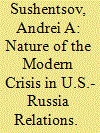| Srl | Item |
| 1 |
ID:
164261


|
|
|
|
|
| Summary/Abstract |
The current state of U.S.-Russia relations is often compared with that of the Cold War. However, contradictions today between Moscow and Washington do not determine the dynamics of modern international relations. The confronta-tion between these two countries embraces all spheres (informational, eco-nomic, and political), resulting in a highly-dependent situation where conflict impacts all areas of cooperation. Relations between Russia and the United States сlearly manifest a psychological phenomenon known as fundamental attribution error that indicates a tendency towards explaining the behavior and actions of other people by their bad qualities and one’s own behavior by exter-nal circumstances. At the same time, the U.S-Russia confrontation is taking place against the background of a de facto political “civil war” within the Ameri-can establishment, which has greatly disrupted foreign policy decision-making in Washington.
|
|
|
|
|
|
|
|
|
|
|
|
|
|
|
|
| 2 |
ID:
164051


|
|
|
|
|
| Summary/Abstract |
This article analyzes development prospects of relationsbetween Russia and Japan as Japanese diplomacy toward Russia becomesmore active. In May 2016, Prime Minister S. Abe put forward an eight-pointcooperation program. More than 100 economic agreements have been signedwithin the framework of that program; however, most of them have not beenimplemented. The author examines the reasons for failure of these bilateral This article analyzes development prospects of relationsbetween Russia and Japan as Japanese diplomacy toward Russia becomesmore active. In May 2016, Prime Minister S. Abe put forward an eight-pointcooperation program. More than 100 economic agreements have been signedwithin the framework of that program; however, most of them have not beenimplemented. The author examines the reasons for failure of these bilateral relations to develop.
|
|
|
|
|
|
|
|
|
|
|
|
|
|
|
|